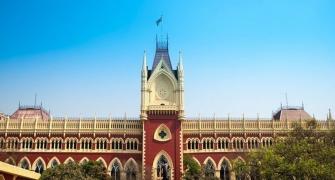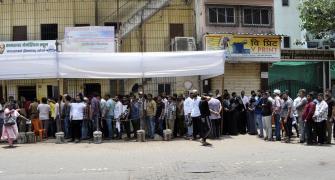If one were to list the factors that have impeded India from attaining a higher growth path, the government's high fiscal deficit would appear at the top.
While deficits are not necessarily bad, more so for a developing economy, if unchecked, they have the capability to ruin a nation's finances, thus having an ultimate impact on its citizens.
 |
 | |
| Source: CMIE, World Economic Outlook, 2003 | ||
'Deficits' defined
Before moving any further, let us briefly define the various types of deficits.
-
Fiscal Deficit is the excess of government's expenditure over its receipts in an accounting year. More simply, it equals the amount of borrowings made by the government in a year.
-
Revenue Deficit, on the other hand, is the excess of revenue expenditure over revenue receipts.
-
Primary Deficit is measured by removing interest payments from fiscal deficit.
Deficits are a feature of any economy and more so of a developing economy due to the compulsions of investing for future growth. However, if one were to categorise the Indian government's expenditure into various heads, there emerges a stark reality.
A large portion of the Indian government's receipts goes towards unproductive areas like interest payments (28%) and subsidies (11%). And this has been one of the foremost reasons for India's slow rate of growth in the past.
Talking about interest payments first, their prominence can be established from the fact that the government's outstanding internal debt to GDP currently is around 42%, which is high by any standards.
And this high absorption of capital by the government seems to have had a crowding out effect on private investments that has further resulted in the slow rate of economic growth.
While there is no denying the fact that the government has been in the process of restructuring its high cost debt to low cost, the quantum of debt outstanding has kept on rising and that is a cause of concern.

Source: CMIE
As far as subsidies are concerned, it is not to say that they are bad in every sense of the word. Subsidies are a form of protectionism that are provided to make domestic goods and services artificially competitive against imports.
However, in most of the cases, subsidies in India have failed to serve the real purpose behind the government's intention of providing the same. And this has been the reason for their unproductive nature.
In the Indian context, heavy subsidies are given to the farm sector in the form of Minimum Support Prices (MSP) for crops and fertilizer subsidy. Due to the lack of proper implementation of these subsidies and lack of land reforms, these subsidies have benefited large landowners more than the population towards which it is directed.
Also, MSPs have discouraged Indian farmers from cultivating cash crops with higher yields and better price realizations. Thus, apart from rising subsidies, the whole objective of the same has not been met in the country.

Source: RBI's Report on Currency & Finance, 2003
How they affect economic growth?
Now let us come back to the important issue of how high fiscal deficit can affect economic growth. Higher fiscal deficit in India has been one of the major reasons for relatively higher level of inflation in the Indian economy as compared to other developing and developed nations.
The cycle of high deficit and high inflation can be explained in two different ways. Firstly, high fiscal deficit indicates a high level of government borrowing that has a tendency to reduce the availability of capital. This leads to lower liquidity and consequently higher interest rates and higher inflation.
On the other hand, assuming that the government is borrowing to invest in the economy, this leads to increased spending that leads to greater money supply in the economy which can further lead to inflation if output fails to keep pace with this increased amount of spending (which has usually been the case in India).
Further, to curb a rise in the level of inflation, the central bank resorts to a hike in interest rates, something we are likely to witness going forward. Thus, we see that high fiscal deficits could lead to higher interest rates and it could further fuel inflation in the economy if not checked adequately.
The government seems to be finally awaking to the grim reality of these deficits. The new government's common minimum program aims to wipe out the revenue deficit by March 2009 (March 2008 was the deadline as was mandated by the previous government).
However, the fact that this government has also alongside announced some populist measures that are likely to put more burden on its finances, the accomplishment of the aim seems improbable.
To quote Raghuram Rajan, economic counselor with the International Monetary Fund, "The beauty of India's fiscal deficit is that somehow, the consequences of the lack of fiscal prudence are not showing up. But, that said, we would be making the mistake not to deal with the fiscal issue on a priority basis."
He further says that if India sees a surge in private investment, there will be more competition for funds for the government. And if the government fails to lower this deficit, the Indian economy will have to bear the consequences of very high interest rates. Now, do we need to say more?
Equitymaster.com is one of India's premier finance portals. The web site offers a user-friendly portfolio tracker, a weekly buy/sell recommendation service and research reports on India's top companies.








